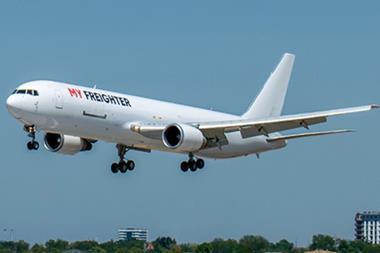In two days' time (April 22) Canadian carrier WestJet will launch its first-ever freighter service following the certification of its 737-800 Boeing Converted Freighters (BCF) in March.
The operation will initially start with three 737-800BCFs flying between Calgary, Halifax, Toronto, Vancouver, Los Angeles and Miami.
However, WestJet executive vice president for cargo, Kirsten de Bruijn said that the carrier hopes to expand flights into Latin America after it adds its fourth 737, currently in modification in Costa Rica.
De Bruijn wouldn't be drawn on exactly which countries the airline would target - as the carrier is still in the process of registering the aircraft in those countries - but said that they are likely to be in the northern part of Latin America.
Due to the range of the aircraft, the flights will need to include a stop in the US to avoid breakage in the maximum payload, which for the 737-8000BCF is around 23 tonnes.
"I want to get the approvals [before announcing destinations]," de Bruijn said. "It will be in the north of Latin America because we need the maximum payload to feed the Miami hub."
On the services that have been announced, de Bruijn said that the first focus is on serving the domestic Canadian market and then optimising its current bellyhold network which includes 787 Dreamliners.
She explains that the airline recently announced its 'Go West' strategy which will focus on Calgary as its main hub for its widebody passenger flights.
The freighters can be used to move cargo into and out of Calgary to help fill the widebodies through "beyond selling" with links to other Canadian destinations.

Los Angeles will similarly help optimise the widebody belly. Meanwhile, the Miami flights will cater to imports and exports coming to and from Latin America and Canada.
On other investments, the airline has already added a new management team and a new digital platform but she says there are further improvements to come from the new system.
Product managers are also being added to the team which will allow the carrier to further enhance its offering to make the most of the opportunities offered by the freighter aircraft.
She explained: "Regulations for freighters are completely different so we can expand the container types we can offer, there are quicker cut-off times because the security requirements are different for domestic Canada rather than international, and also freighter to freighter is different to freighter to belly with security and screening requirements."
"Those are our main strategic focuses for this year while in the background working on and confirming the long-term strategy."
On launching freighter services during a slowdown in demand, de Bruijn felt that the current trends were more of a normalisation than a downturn following the post-Covid boom.
She pointed out that volumes were roughly tracking pre-Covid 2019 levels.
Meanwhile, she added that the size of Canada, the weather conditions and difficulties for overland transport meant freighters would always be required, especially in the northern part of the country.
"We are less affected than the global economy, but I'm not saying we are not affected and that we don't see the pressure in the current market," she said, adding that as a new entrant into the current market conditions had meant the airline had been laser focussed on having a good launch.
She also pointed out that freighters are a long-term investment and air cargo has always been a cyclical market.
On the launch of flights this weekend: "I am really happy that we can start and show the market that has been hearing about us for the last two years that finally the day has come."
https://www.aircargonews.net/airlines/westjet-adds-its-first-freighter/
https://www.aircargonews.net/airlines/westjet-to-enter-the-freighter-market/













